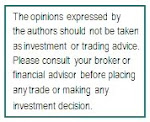 Top 5 banks make a come-back with record returns expected according to published year-to-date earnings. Morgan Stanley, Goldman Sachs, Citigroup, JP Morgan Chase, and Bank of America, are all expected to end 2010 with hefty revenues. The first half of the year was dampened by market and investor uncertainly, but by the third quarter the market was able to find solid ground, and began building a fierce momentum.
Top 5 banks make a come-back with record returns expected according to published year-to-date earnings. Morgan Stanley, Goldman Sachs, Citigroup, JP Morgan Chase, and Bank of America, are all expected to end 2010 with hefty revenues. The first half of the year was dampened by market and investor uncertainly, but by the third quarter the market was able to find solid ground, and began building a fierce momentum. Year-to-Date Record Returns:
- Bank of America: $83.8 billion
- JP Morgan Chase: $74.1 billion
- Citibank: $67.8 billion
- Goldman Sachs: $30 billion
- Morgan Stanley: $23.8 billion
 Consumer spending is up this holiday season, as retailers saw pre-recession shopping levels. The preliminary holiday sales revenues are reported to be $451.5 billion, an increase of 5.5% over 2009. Online holiday sales were reported to be approximately $36 billion, a 15% increase over 2009. This should serve as a sign of what’s to come, yet we may still find ourselves waiting longer than we’d like.
Consumer spending is up this holiday season, as retailers saw pre-recession shopping levels. The preliminary holiday sales revenues are reported to be $451.5 billion, an increase of 5.5% over 2009. Online holiday sales were reported to be approximately $36 billion, a 15% increase over 2009. This should serve as a sign of what’s to come, yet we may still find ourselves waiting longer than we’d like.Although the bank revenues and retail sales data is encouraging, you may be thinking that it is somewhat detached from the rest of the economy.
 I would be inclined to agree with you, as the housing market remains on life support, and national unemployment rate is still above 9 percent.
I would be inclined to agree with you, as the housing market remains on life support, and national unemployment rate is still above 9 percent.I am sure that millions of Americans who are currently unemployed (or underemployed) fail to see the silver lining - but we are beginning to see an increase in job growth. In fact, this year did actually produce net job growth amounting to 500,000 new jobs, but with over 10 million people unemployed, half a million jobs is simply not enough. With all the hope of better things to come, and the promise of "The American Dream" a faint recollection, 2011 could not come soon enough.
K. Reilly
Cohn-Reilly Report
________________________ RECOMENDATIONS
Also Check out:
Socially responsible Investing site below:
SocialResponsibleInvest.com
________________Comment
Robert Ortega said......
Its great that the banks were able to bounce back to make record profits. The TARP money has apparently been paid back with lots of interest, so the government also made good money on the Bailouts. What I don't understand is how the Tea Party clowns manage to construe this as a bad thing. We made money on the bailouts, the banks are profitable again, and the economy is clawing out of the recession and gaining momentum. Makes you wonder what the issue really is for republicans? - January 9, 2011
________________Comment
K. Reilly said......
Rob, I happen to agree with you on some level. There are many positive economic factors that depict that the recovery is progressing. There are hidden agendas and racial overtones that seem to be the underbelly of the tea party movement, but it is hard to pin-point the real objective other than to "take back" America (whatever that means). Let's face it, Politics, as we have come to know it, is never about Truth, Transparency or Honesty, it is about money and power - Period.
With respect to your comment about how the Tea party “construed” the economic progress. The white house and the Democrats failed to effectively get the Positive message out to the public along the way. Although there was not much to cling to in the first 12 months of the Obama Administration, they did little to counter the negative, and aggressive propaganda coming from right wing politicians. Admittedly it would have been difficult to challenge the FOX News media monster, but certainly better than ducking criticism. Nevertheless, the Democrats and the Obama Administration were asleep at the wheel for the midterm elections, thus the republicans and the Tea party, who were on a serious mission (though separate agendas) have successfully lobbied and rallied themselves into back into power on Capital Hill. To be honest with you I think it is generally much better with the mixed majority than all Republican or all Democrat for house and senate. The law makers are forced to reason, discuss and compromise than when they are gloating and flaunting their power around.
Thanks Rob, your comment is much appreciated- - January 9, 2011





















